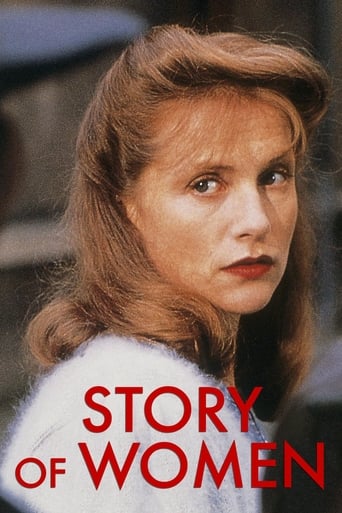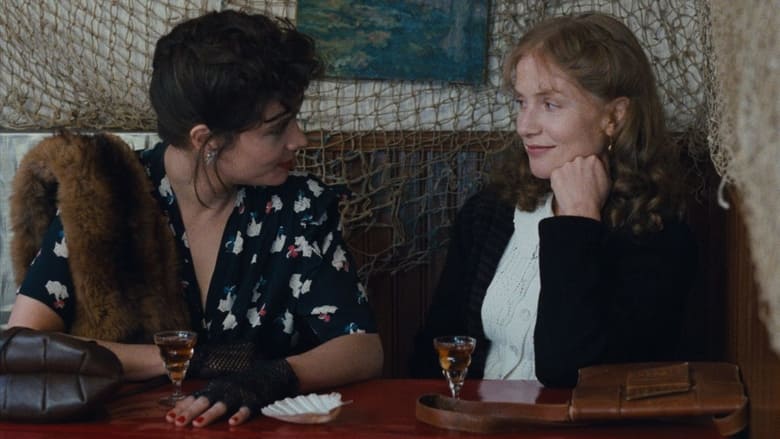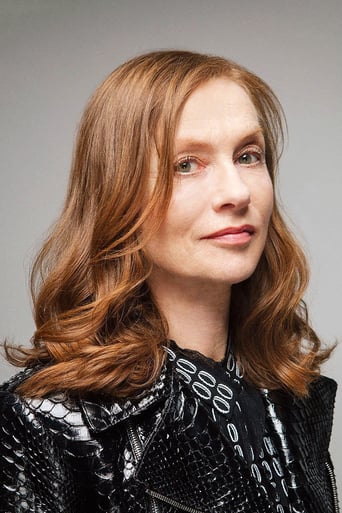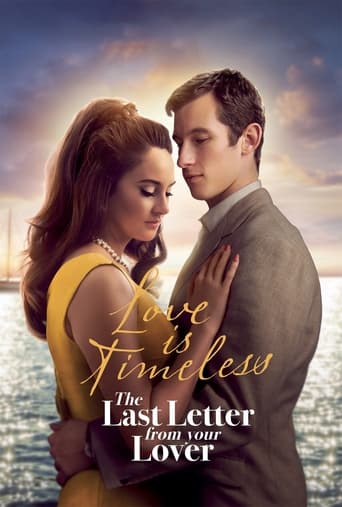

Story of Women (1988)
France, World War II. In order to somehow make ends meet, the mother of two children, Marie Latour, does underground abortions and rents a room to a familiar prostitute. She doesn't pay any attention to her husband, who returned from the war because of his injury and lives her own life. Abortions gradually begin to bring a good income, and boredom can be easily dispelled by starting a young lover.
Watch Trailer
Cast


Similar titles
Reviews
Marie Latour, a woman of limited schooling, raises two children in a ratty flat during World War II in occupied France. In 1941, her husband Paul returns from German captivity, too weak to hold a job. Marie discovers she can make money performing abortions, using a soapy water douche. Many of her clients are knocked up by occupying Germans.The film is based on the true story of Marie-Louise Giraud, guillotined on July 30, 1943, for having performed 27 abortions in the Cherbourg area, and oddly enough has been embraced by John Waters. Waters is typically known more for endorsing "Christmas Evil" than French cinema, but this just goes to show how diverse his love is.I find it quite interesting that the French women are getting pregnant by German soldiers. While this is a frequent consequence of war (though hopefully diminishing), and virtually created modern Sicily, it is a rare thing to see it show up in a film. For that, I applaud them.
Isabelle Huppert portrays an uneducated but self-reliant wartime mother of two, who almost ruthlessly assumes the traditional male role of family breadwinner by helping (to use an old euphemism) young girls 'in trouble'. The film isn't exactly impartial in its attitude toward the opposite sex, but don't me misled by the somewhat presumptuous title: it isn't strictly a story for women, and despite the vocation of its heroine has little to say about the volatile issue of abortion. The focus is more on the plight of women as second-class citizens, forced by necessity to fend for themselves (and rely on each other) while their men are away playing soldiers. It tells a complex story very simply, avoiding any soapbox grandstanding but allowing Huppert a chance to invest her character with plenty of gender-specific spleen. The final impact is undeniable: it's an often powerful experience, likely to stir up plenty of talk and emotion.
Definitely one of director Claude Chabrol's best films, if not his best.It is based upon a true story out of Nazi occupied France, and stars the incredible Isabelle Huppert (The Piano Teacher, 8 Women). She is supported by Marie Trintignant (Harrison's Flowers), who had her career cut short by an untimely death.Huppert finds a way to feed her family. She performs abortions and rents out rooms to prostitutes. Everything seems to be going well for her, but her husband is not happy about the fact that he hasn't had any in 10 years, and she now has a lover - he turns her in.France is now rid of the Germans and is trying to restore her morality. Unfortunately, Marie to be made an example.Huppert was great, and Trintigant was also very good.
I'd like to focus on this film as a French film, not of the United States. If one has seen "La Chagrin et la Pitie," then one knows the legacy of this film. France was not perfect during WWII. Not everyone in France was part of the resistance, mainly, they were trying to survive. I think its an amazing film that sheds light on a crucial point in French history. Yes, it's about abortion and Chabrol does a great job ensuring his abortionist is less than perfect. That's a wonderful point he makes, that no one is perfect, not even the moral majority of the government. But, I come away from this film with the same questions that I get from "Lacombe, Lucien," which are: 'what would I have done?' And, please, don't Monday morning quarterback World War II.














